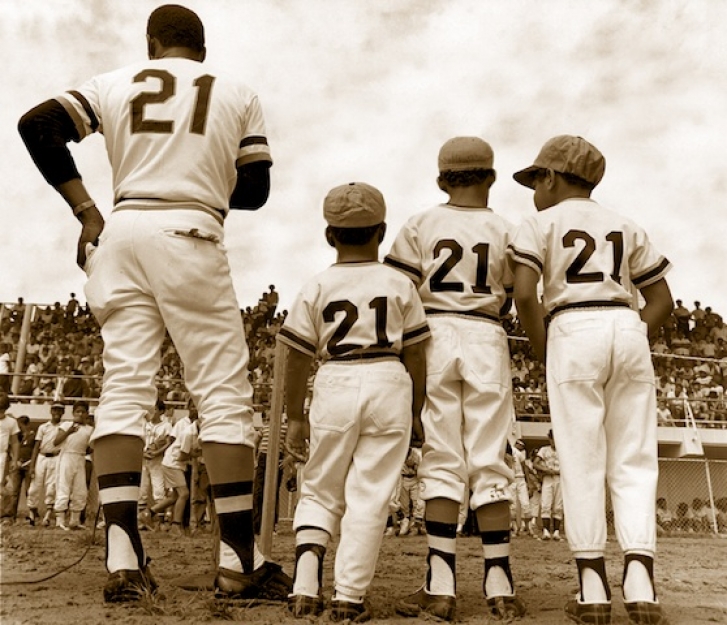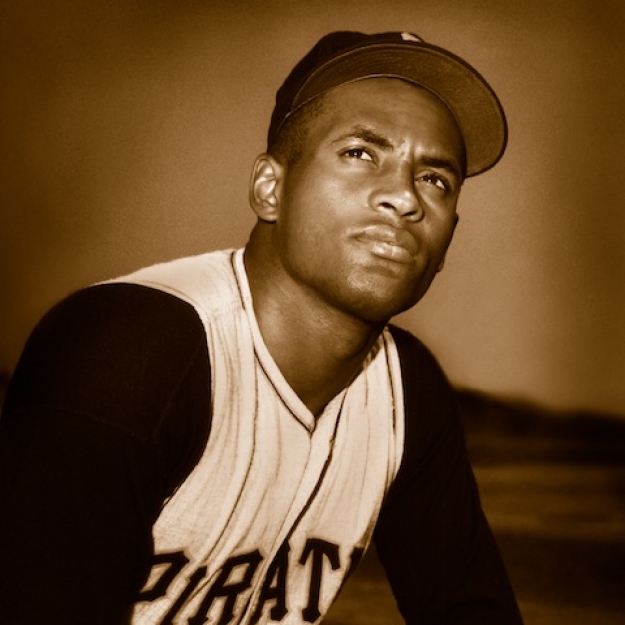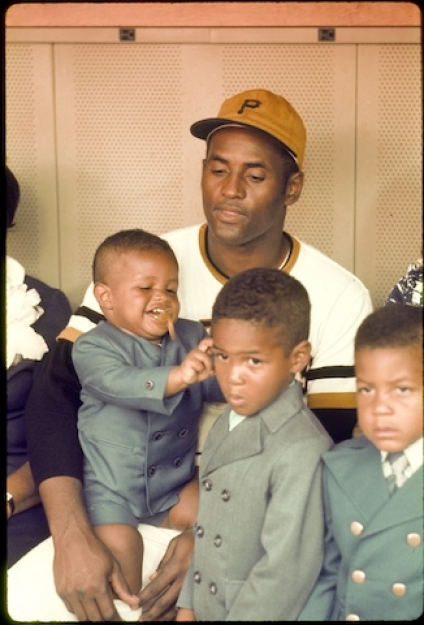
What inspired you to do this book now, forty years after your father’s death?
Luis Clemente: We’re beginning to move forward with many of the family’s projects. The timing was just right to tell our story the way we know it. For many, many years, we’ve been on the road attending events. I recently came back from New York after the unveiling of the statue at Roberto Clemente State Park. It is the first statue of a Puerto Rican in all of New York. On Mother’s Day, we were in Chicago to visit the Roberto Clemente elementary school. While we were there, they named a new ballpark in Nicaragua after dad. And the University of Pittsburgh is creating a scholarship in dad’s name. We want to build a true relationship with all of the different organizations that utilize dad’s name and set a standard for how it will be used.
The book is a wonderful celebration, not only of your dad’s life, but of your family. I don’t think people can appreciate how difficult it is to be reminded even inadvertently about the toughest moment in your life. At that age, how difficult was it for you to talk about so often?
Roberto Clemente Jr: Personally, being the oldest, I always had a problem with dad leaving us to go on a flight anywhere. As a kid, I knew where he kept his plane tickets, and I would grab them and hide them so that he might miss the flight. I remember not wanting him to get on the plane. For me, every time people would hear my name, they would say, “Wow, that’s amazing! You’re so lucky to have a dad who was an idol, and they would talk about my father that I miss dearly. So no doubt, it was tough growing up and having to field all kinds of questions every single day, but as I became an adult, I gained an appreciation of who he was. We didn’t just lose a ballplayer, a legend was born. We’ve been able to utilize that to try to help other, and to me, that is what he has left us, and what we’ve tried to do for the last 40 years.


Your father married your mother when he was 30. In that generation, that was a fairly late age to get married. Does your mom talk about how they met and how their marriage came to be?
Luis: My mom has been opening up more lately about the details. Dad knew immediately when he saw her, the honesty and the purity of this woman. It caught his heart. Ten years after being in the Major Leagues, he has already established himself. There were a lot of women who wanted to meet him. The fact that he waited that long, until he met our mother, is something that means a lot to all of us. How they flourished as a couple, for us it is very special.
As much as the book says about your dad, it really lets the world know a bit more about your mom who has carried the legacy of your dad’s dignity.
Roberto Jr.: It was my father’s long time dream to incorporate Roberto Clemente Sports City (an athletic and educational facility for kids in Clemente’s hometown of Carolina, Puerto Rico). After his death, my mother dedicated her whole life to that project. I can’t tell you how much she’s traveled without being remunerated for it. She’s been devoted to what our father stood for and to what she stands for. She’s had a passion to selflessly help kids.
Readers may also be surprised to realize how much of a pioneer your father was for Latin players. He really paved the way for many of them to play Major League Baseball.
Roberto Jr.: He was not prepared for what he had to handle when he came stateside from Puerto Rico. Going to Montreal to play minor league baseball was quite a culture shock when he got there. Once he established who he was, he opened his door, especially to Latin players from the visiting teams. They could come and talk about any issues. He became a speaker and tried to protect the Latin players. It was his mission. He was able to open the eyes of the Major Leagues to the quality of players coming from the Caribbean. He wanted to make sure that once he became a star that he used the platform to be the activist that he was and to share the message of equality for all people. Marvin Miller was very grateful to our father during the implementation of the Major League Baseball Players Association. Dad was the first player ever to be elected to represent all of the players.
In creating the book, did you learn more about your father?
Luis: It’s a continuing experience. Every single day, we find out things that we didn’t know or realize the way we are. We hear anecdotes from other people. They say, “You must be tired of people telling you these stories.” And I always say, “No! This is how we continue to get to know our father more, and why we do things the way we do.” I can’t tell you how many different lives he touched; how many people have their own story—something they read or saw. We welcome all of them.
How did your father differ at home from his image on the field?
Roberto Jr: There was a game face that dad would have when he was ready to leave the house. As he went to the ballpark, he had a game plan. He was visualizing the pitcher and going through at bats. After the games, I can remember getting in the car and driving home. Mom and dad would go into the kitchen and start to cook. I never knew how many people were coming. But they would be there at 10, 11 o’clock at night cooking for guys that they invited from the other team. Guys always appreciated a home cooked meal, especially on the road. He would welcome them and tell them stories. Dad was a very artistic guy. Everyone would let their hair down. He would tell funny stories. He would do all of these impersonations, In baseball, you are all in the fraternity. If you play for one team, you play for them all. Dad was a really funny guy. It was amazing to see those relationships he had. It was such a contrast to who he was outside the door. There, he demanded respect not just for himself, but for all Latinos and minorities, English or Spanish. Any minority who was a target, he would speak on their behalf. I can remember strangers knocking on the door at all hours because they knew he had the gift of being a great chiropractor and a healer. At midnight, he would open the door for strangers that needed help. I would watch mom help dad work on their backs, because he was able to understand what the problem was and alleviate the pain that hindered them. It was pretty neat to watch. I was in awe at the time because I didn’t understand what was happening.
You both played professional baseball. There must have been enormous pressure to carry the Clemente name. But in following in his humanitarian footsteps, you’ve been able to touch so many more people.
Luis: Growing up with that pressure of being his sons, yes, we both played professional baseball. When I stopped playing, I thought to myself that if I could keep playing and make it to the Majors, I would have been a millionaire. But I wouldn’t have been able to truly immerse myself into the humanitarian ways that distinguished my father and the whole family. We’ve gone so much further than a million dollars could have taken us. We’ve been able to help transform lives by speaking to so many people. I’ve always says that I’m extremely proud of being Roberto Clemente’s son. But I’m equally proud to be Vera Zabala’s son as well.
What would you like people reading the book to take away from it?
Luis: I would like people to understand that there’s so much more to who our father was than what they’ve previously read. I’m totally sure they will love him even more and become bigger fans, now that we are opening up a bit more about our story. I hope that some of the work our family has done will be appreciated as well. We don’t go around saying it very much. Like our father, we are very proud of who we are, but at the same time, we must be very humble as well. I hope people will learn from that. We’ve never misused the family name.
Roberto: Our father was a very simple, but also a very complex I hope people see the humble part of who he was as a superstar. He was a working man who loved and fought for the working class and for justice. Even today, kids are learning about who he was and are becoming big fans of him. We really want to highlight not just the player he became, but who he was as a human being




